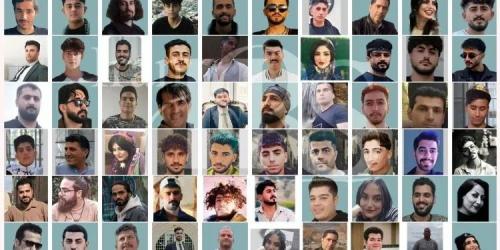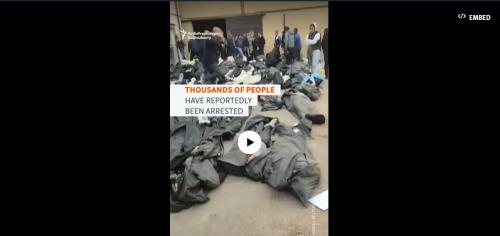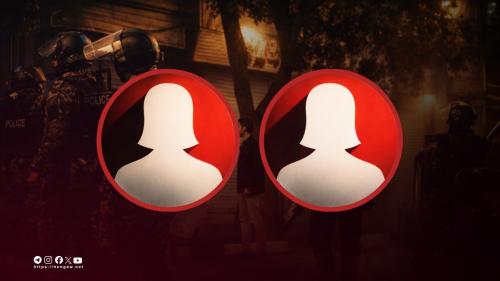07 July 2003 :
Five years ago, when I was still campaigning to be Governor of Illinois, I would have never guessed that some day I would be confronting the injustice of our capital punishment system. I certainly never imagined I would be sharing my thoughts on a worldwide moratorium to halt executions in the annual report of a committed human rights organization like Hands Off Cain.
But you never know what life and the Good Lord have planned for you.
In January of 1999, I had the very good fortune to take the oath of office as Governor of Illinois. Within a matter of weeks, I was faced with the ultimate nightmare, the case of an innocent man nearly killed for a crime he did not commit.
I had to reach the highest office in the state of Illinois to understand that if you are poor and a minority, like Anthony Porter, the system is stacked against you.
Everything I believed about our criminal justice system came into question.
I had always believed that we caught the bad guys and locked them up. I thought the innocent man being sent to death row was the stuff of Hollywood.
Now, in February of 1999, I had a case where journalism students working with a private detective gave a man his freedom. Had it not been for them, Anthony Porter might be dead today. He came within 48 hours of being executed. He had ordered his last meal and been fitted for his burial suit.
That´s a pretty sobering thought.
But despite the questioning, I resisted calls for a moratorium.
Shortly after Mr. Porter was freed, my first capital punishment case came to my desk. Andrew Korkorales was convicted of a monstrous, unspeakable crime. He and his evil cohorts would kidnap young women on the street and torture, mutilate, assault and kill them.
After seeing how the system failed with Porter, I was deeply concerned with making the right decision.
Korkorales´ case seemed to be one of those for which the death penalty was meant.
But what, I asked, if he was innocent.
So I reviewed the files from the prisoner review board and decided I needed more information. I requested more files on his case. I talked to defense lawyers. I talked to prosecutors.
I talked with investigators on the case and I met with elected officials from the community in which one of his young victims lived. They said in the name of justice Korkorales should be killed.
I heard from religious leaders, who opposed the execution of Korkorales on moral grounds.
Ultimately, I played God. I sat in judgment of Korkorales and I allowed his execution to proceed in March of 1999.
I was confident that he was guilty, guilty of a crime that is beyond comprehension.
But I was also shaken and I felt empty.
It all came down to me. It is the toughest thing a U.S. Governor can do. I made the decision to take another man´s life.
That feeling would only gnaw at me more over the next several months as more troubling evidence surfaced proving that the capital punishment system in Illinois was badly broken. Three more men were freed from death row after serving lengthy prison sentences for crimes they did not commit.
In November of 1999, my morning paper provided me with the chilling numbers that proved to me what I already was starting to believe: our capital punishment system had collapsed.
• 33 of our death row inmates had been represented at trial by lawyers who had latter been disbarred or suspended from the practice of law.
How does that happen?
• Of the more than 160 death row inmates, 35 were African-American defendants who had been tried by all-white juries.
• More than two-thirds of the inmates on death row were African-American.
Is that justice? Reading that made me wonder if I was in fact reading about the court system of the Apartheid government of South Africa?
• 46 of the inmates were convicted on the basis of testimony from jailhouse informants. The most unreliable form of testimony I can imagine.
It was, as I have since described it, a shameful scorecard.
By January of 2000, the anniversary of my first year in office as Governor, the justice system of my state had exonerated more inmates than we had executed. 13 exonerated, 12 executed.
Our system in Illinois had disbarred lawyers representing poor criminal defendants facing execution. All white juries sentencing black men to death.
Jailhouse snitches cut deals with prosecutors to win their freedom in exchange for helping to send someone to death row.
Is that justice? No. It most definitely is not.
Is that fairness?
No. Not by a longshot.
Before I entered government I was a pharmacist. I spent my life providing medicine to people to cure them, maybe even to save their lives. My brother and I followed my father into the business because it was a way to spend our lives helping people.
But now, as Governor, I was the man who had to give the final order for the executioner to inject a fatal dose of poison into a man´s veins. I decided whether or not a lethal injection would be administered to an inmate so that he could die on a gurney in an antiseptic, cold death chamber before a room full of witnesses.
Knowing what I came to know in January of 2000, I did the only thing I could do. I called a halt to the system of death in Illinois.
It was the right thing to do. How could I let a system go on that decided who should live and who should die with the same accuracy as if I flipped a coin.
Heads or tails, are you guilty or are you innocent.
Should you live or should you die?
But halting executions was just the beginning.
Shortly after I declared the moratorium, I appointed 13 of the brightest, dedicated citizens to review the entire capital punishment system and find what had gone so terribly wrong.
They reviewed every case of the inmates on death row. Every case.
They reviewed each of the cases of the innocent men who had been exonerated.
It took two years of painstaking work.
In the Spring of 2002, they produced a remarkable document.
It was a report on the entire system in Illinois. And it made 85 recommendations for reforming the system. None of those recommendations was passed into law while I was in office. The new legislature in Illinois is embracing some of the reforms, but the flawed system in Illinois remains largely in place.
Earlier this year, I reported to the people of Illinois that our record was even worse than I previously thought.
I found four men, Aaron Patterson, LeRoy Orange, Stanley Howard and Madison Hobley, had been tortured by police detectives and forced to confess. It happened about 20 years ago. All four men told similar stories of abuse they suffered at different times.
All four were beaten and bagged—typewriter covers put over their heads to suffocate them until they passed out. Leroy Orange was subjected to an electric cattle prod.
The appellate record says Aaron Patterson cried for his father as he was tortured. Like a lot of the cases, it was clear Aaron Patterson was no angel. He had brushes with the law, he was involved with gangs.
But there is no evidence proving he committed the murder for which he was sentenced to die. Aaron Patterson said he was threatened at gunpoint. He said he was beaten and bagged. He used a paper clip to etch proclamations of his innocence into the table and doorway of the interrogation room.
Can you imagine the nightmare?
Stanley Howard was denied access to his family and subjected to beatings.
The witness who linked him to a shooting had been drinking heavily and only made a tentative identification six months after the killing. His guilt was contradicted by ballistics evidence, but he confessed after being tortured.
Madison Hobley was tortured but refused to confess to an arson murder which claimed the life of his own wife and child. Instead of having time to mourn, he was arrested, charged, tried and convicted based on scant evidence. A police officer on his jury allegedly pulled his gun and put in on the table in the jury room announcing that today was the day they would arrive at a verdict.
We studied the death row cases for three years. As we discussed these four cases, I was told they still had appeals pending, that they still had a chance at justice.
As I neared my decision on what to do about the system that no one wanted to reform, I went back and looked at their cases again.
It was clear they were no closer to justice than they had been 20 years earlier. Court after court found technicalities to avoid making a judgment about whether these men had been properly convicted and sentenced to die. Time after time, they cited issues like waiver to avoid the ultimate issue. I would turn to the lawyers on my staff and ask where is the fairness? Where is the justice?
What took so long for someone to make a stand about what justice and fairness should really be about?
When I pardoned these men, who were convicted solely on the basis of the alleged confessions they made after being beaten, suffocated, threatened at gunpoint and electrocuted, the local prosecutor said I had set murderers free.
Is this justice?
The painful uncovering and reviewing of the tremendous flaws in our capital punishment system began on my watch.
In the end, I felt it was my responsibility to do everything in my power while I was governor to ensure this kind of injustice never happened again.
I personally went through each and every case of the inmates on death row, after my staff went through each case several times.
I came to the conclusion that, like the 17 we had exonerated, there was really no reliable way to separate the guilty from the innocent.
I also came to believe that even those about whom there was little or no doubt about guilt had more mitigating in their favor to spare them death.
This was another step in my journey from a capital punishment supporter to someone who believes the system can´t function fairly.
So I turned to the words of famous U.S. Supreme Court Justice Harry Blackmun. I said I too would no longer tinker with the machinery of death.
The system was rotten to the core. It was arbitrary, it was capricious, it was unjust, it was racist, it was unfair to the poor and it even treated the victim´s families badly. It was all of these things and yet there was no sign of reform in sight.
So I commuted the sentence of every death row inmate. Even as I write this piece, my decision is being challenged by prosecutors back in Illinois. I suspected it will be debated for many days to come.
But slowly but surely, I came the realization that many in Hands Off Cain understood long ago. There is no justice in the capital punishment system as we know it in the United States. I´ve was forced to confront the moral issues. I was forced to confront the injustice.
Anyone that kills another human being can´t really be sane. Some of these murderers committed heinous crimes, crimes as brutal as that of the man I allowed to be executed, Andrew Korkorales. I began to ponder: do we execute the insane? Is that humane? Does that befit the greatest justice system of the greatest country in the world?
But the more I pondered the imponderables, the deep philosophical questions about capital punishment, the more I thought life without parole would be a far greater punishment for those that kill.
As a Christian, as in every other faith about which I am familiar, death is viewed as a reward. Are we rewarding heinous killers? One death row inmate, Danny Edwards, a man I believe is guilty, sent me a letter during my deliberations pleading with me to either free him or allow him to be executed. He said life in prison was a fate worse than death.
He is suffering that fate today.
These are difficult times to be raising questions about the morality, justice and fairness of capital punishment. But in my view, now is the time to be a beacon of light to the world. There is no better time to have a vision for a more perfect justice system.
That is exactly the vision of Hands Off Cain. The dedicated men and women are committed to the cause of justice in the name of humanity. They are convinced that no man or woman should spill the blood of their brothers and sisters. As someone who has shouldered the ultimate responsibility of sitting in judgment as to whether a death row inmate should live or die, I can say I have serious doubts as to whether any one man or woman should bear that burden. How can we divine who can play God?
Illinois was home to America´s greatest president, Abraham Lincoln, who saved the Union in its greatest trial, the Civil War. More than any leader in the history of the Western World, he promoted justice and humanity when he freed the slaves, putting an end to a sorrowful chapter in American history. President Lincoln once said, "I have always found that mercy bears richer fruits than strict justice." Seven score years later, President Lincoln´s words provide a guiding moral light for all of us.








